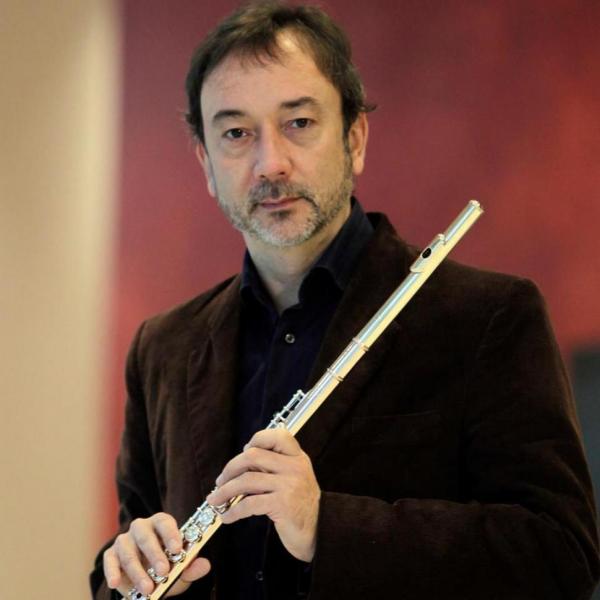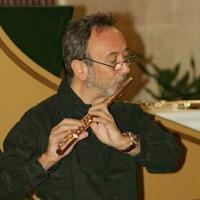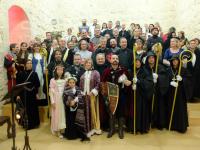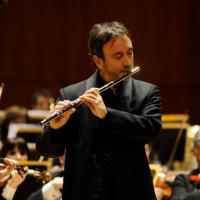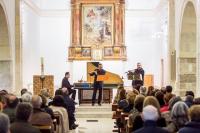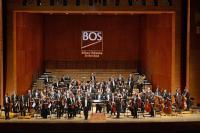Yulia Berry: Hello Horacio! Congratulations on becoming Haynes Artist! As I know, now in Spain there are only two Artists of this legendary brand, which is famous for its 125 years of history in flute making and the highest level of craftsmanship. What year was your Haynes flute made?
Horacio Parravicini: Thank you, Yulia! I have two Haynes flutes. One is from 1985 and the other is from 1967. The 1985 model is a Deveau Haynes with a modern scale, the other has the previous scale. Both are silver flutes, made with coin silver metal.
What do you think about the sound? How different is it from other flutes you played?
The 1967 flute has a very different sound than the modern flutes. It has a mellow sweet sound, I would even say it is a pure color. Clear and pristine - like the impressionistic French watercolors.
Why did you choose the flute over the other instruments?
I was learning the classic guitar first, but while visiting museums with my grandparents I always felt fascinated by paintings showing flute players. I think the strange way of taking a musical instrument attracted me so much. At that moment I was in a boy scouts group and had a friend there, who played the flute. His mother was a cembalo teacher and she connected me with my first flute teacher, the Italian flutist Alfredo Montanaro.
Is there another art that inspires your flute playing?
Yes - the visual arts. The paintings and the photography because music is an abstract language and even if it doesn't need to be complemented, sometimes it needs some kind of image. Many musical compositions are related to the title “Image”: Debussy’s Images for piano, Bozza’s Image for flute, and others.
Do you think it is important for a performer to have a wider cultural horizon?
We live in the era of specialization, in which there is a huge amount of information about every field the mankind is walking through, and the perspective is increasing this fact. Musicians like J.S.Bach and Quantz were able to play other instruments. Telemann, for example, was a self-taught recorder player. Every aspect was taken in order to compare and enrich their art. Arts are related historically and every work of art is the consequence of a certain moment. I think it is very important for a musician to have the knowledge of other arts, as it will enrich the musical interpretation and the feel of consciousness in playing.
Who are your favorite composers and why?
Without any doubt the Baroque composers. Because with pure elements they created the most valuable and everlasting heritage. Take for example the first movement of Telemann's recorder sonata in C Major TWV 41:C5 or the Aria “Aus Liebe” of St Matthew’s Passion, it's marvelous how without any artificial element the music goes into the highest standards of quality.
What is the fundamental repertoire that a flutist should play?
The flute repertoire fortunately is vast and also has the advantage of many levels of difficulty. I think it is very important to play studies by Boehm, Andersen, and others because the purpose of it is to enhance the quality of playing, reading in different tonalities, rhythm and intervals. Some of them are very beautiful Adagios - a perfect place, where you can enjoy the magic sonority of the flute. Also, we have the privilege of having the most important composers among our music. The sonatas of Handel, Telemann, J.S.Bach, C.P.E Bach are milestones of our repertoire. The music of the French composers of the XX century is very nice to play - it explores the natural sonority of the flute in a very artistic way. Certainly the XX century offers a big variety and quality of music. Debussy, Poulenc, Prokofiev, etc. A special mention for a special gem goes to “Piece” for flute and piano by Gabriel Faurè.
What is the repertoire that you play most frequently?
I can divide my repertoire in a few different areas. At home I play the kind of practicing repertoire - consisting mainly of exercises and studies such as the exercises of Marcel Moyse, scales, intervals and sonority, studies of Gariboldi and Andersen, to name a few. In my job, as part of the symphony orchestra we play above all romantic and modern music - Beethoven, Brahms, Bruckner, Mahler symphonies and the repertoire of the XXth century - music of Debussy, Ravel, Bartok, and many others. The orchestra also has a chamber music season and I played many wind quintets and music with harp. I recently played concerts for two flutes and cembalo. I play the baroque flute (traverso) in sonatas by C.P.E.Bach, Handel and other composers from the Baroque period.
How important is it to study and perform baroque music vs. classical and romantic music?
The ground of our repertoire is the baroque repertoire. All the bases of the music we play are settled there. The baroque repertoire has the perfect combination of clear architecture and emotion. Also, it is very instructive for students. They can discover how the lines of the phrases go and they can practice intonation though the great varieties of intervals. I think this is the repertoire we have to consider at every moment of our career. Of course, the Boehm system flute is a grateful instrument for the so-called golden age of the flute - all the pieces and fantasies by Demersseman, Boehm, Doppler, and Briccialdi. There are also great fantasies with opera themes - a wonderful opportunity to hear singers and try to emulate their styles and their technical abilities.
Is baroque music still interesting to the audience in the XXIst century?
It might be weird to think that during the first half of the XIX century almost no one played baroque music, but it's a historical fact. Nevertheless due to the efforts of Felix Mendelssohn and his family, the name of Johann Sebastian Bach came into light. For example, he performed St Matthew’s Passion and the Baroque Mass in B minor after a long period of obscurity. After World War II, many editions of baroque music became available again. The stream of interpretation in those times was very objective, remarking accuracy of every aspect. Due to the pioneers of interpretation on the original instruments in the nineteen sixties we live in the era of Renaissance of Baroque music. There are many excellent ensembles that bring this music to us, played with the original or copies of historic instruments. Nowadays we can say that the baroque opera will have a bright future without any doubt.
Another reason why the baroque repertoire has an assured future strives in the development of historic instrument makers. I think that a certain pencil or brush can have an influence on the technique and inspiration of an artist. Also, instruments and the material they are made of have the same influence on us. The traverso and the recorder are very sophisticated musical instruments - listening or even playing them might enhance the Boehm flute technique and the sonority perspective. There is no reason to play a standard interpretation, if we consider these aspects. Interpretations are richer nowadays in order of color and variety - an aspect that reinforces the present and the future of this kind of music.
You have been Principal Flute of the Bilbao Symphony Orchestra in Spain since 1988. What is your advice to flutists who want to choose this career?
My advice to flutists who want to be part of an orchestra is based on general musical aspects. Often flute students prepare a very specific flute solo repertoire - sonatas, concertos and solo pieces, and frequently they are the same pieces - of course, this is the main flute repertoire. But sometimes playing only these pieces puts a student on the other side of the symphonic repertoire, resulting in the consecutive lack of knowledge of how the flute works in the symphony orchestra.
The flute in the symphony orchestra is a part of a perfect ensemble, but just a part of it. It is very important to attend and listen to symphony concerts to understand how the flute has an interactive part with the other instruments, depending if it is the solo flute, the second flute or the piccolo. In the orchestra there is no flute style, but a woodwind style. For example, we can't use the same kind of vibrato that we use to play solo pieces, but even there the vibrato should be played in a certain way, which depends on the piece style or the historical moment. Most of the time in the orchestra the mission is to blend with the woodwinds or the string section - the second flute has to play the same way as the soloist does, nevertheless there are glorious soli where you can be creative and inspired. Be familiar with the other woodwinds - how they attack the notes and how to melt in the general chords. Also, keep your ego a little far away in order to feel that you are an essential part of a marvelous machine.
How important is it for a flutist to have an expensive flute? Is it possible to learn how to produce a good sound on a regular flute?
I think expensive flutes exist because it is a musical instrument, an object, and our society offers a wide range of prices of the same article, but it isn't a general rule that the most expensive flute is the best. Prices of flutes depend on the material and the number of hours that the artisan put in it. I think nowadays the industry offers a huge variety of exceptional instruments, the development of the headjoint piece achieved a big progress after the work of Mr. Cooper and in general every headjoint made in our time has something to do with it. The process of making the present flute is not comparable with the work of Louis Lot. Computers and precision machinery are on current use, and the modern scale of the instrument is different, too. Of course the price differs, if the flute is completely handmade or is part of a factory made line. But I don't think that a gold flute is better than a flute made of silver or wood. They are just different.
There is some university research that shows differences in acoustic parameters, the aspect that musicians call color in an empirical speaking. The conclusion is to be aware that if everyone has a specific voice, then every flutist has to have a specific tone. So, don't imitate a tone of an X flutist. Why? Every human being owns a beautiful voice. The advice is to be loyal to yourself. We can add platinum crowns, emeralds, etc, but don't be confused, as the name indicates, this is an instrument to communicate through music, and you are the musician, the artist.
Some people say that listening to a solo flute is not as great as listening to the flute playing with other instruments. What would you tell such people, so that they get interested to listen to flute solo pieces?
The flute is probably the most ancient musical instrument. When someone had discovered that a cylindric tube with holes could produce a sound, this sound became an accompaniment .
I think the music for solo flute connects the instrument directly with our soul - it takes us into a very intimate world, a spiritual one.
Perhaps the flute is the closest instrument to the human voice. All the nuances and colours of the human voice are the inflections of the flute - the fragility, the dark colour. The different intentions are able to be produced with the flute.
Singing alone can heal our soul, and playing the solo flute repertoire can connect us with ourselves.
Recently you took part in a very interesting and unusual festival “Caballeros del Traverso”, celebrating its 10th Anniversary. Could you, please, tell me more about the festival? Whose idea was it? And what exactly happens there?
The idea started ten years ago, when a very good friend of mine from Bilbao, Juanje Silguero, the flutist Claudi Arimany and I met together and started talking about the possibility to meet other professional Spanish flutists, play together and enjoy our friendship.
Juanje took the idea in his hands and we selected a place in central Spain, an equidistant place in the Spanish geography.
We wanted something different, so Juanje in a glimpse of creativity called it Caballeros del Traverso - the Knights of the Flute - a kind of medieval flute order. And things started to work in this direction - medieval Spanish costumes, traditional food, and rules of loyalty and friendship, as they are in the ancient knights orders.
We held the festival for five years in Peniaranda de Duero and for a few consecutive years in Caleruega, the village where Santo Domingo de Guzman was born.
Every year we organize two concerts, a procession and spectacles of medieval dances. And this year the village of Caleruega put our name to a street there.
What are your upcoming flute plans?
Now I have to play season concerts with my orchestra in Bilbao. I plan to record the flute and harp repertoire. I’ll have some concerts in Spain with traverso and continuo. I also have to return to Argentina to play the concerto for flute and orchestra by American composer Jeff Manookian. I will go to Toronto to play in a festival, and of course, many other things.
How does your creativity reflect in your regular life?
Sometimes creativity works as a natural medicine in my regular life. I do photography, I write too, and I can learn from those things and put it into my flute playing.
Is there a question that you wished to be asked, but you haven't been asked? If so, please formulate and answer it.
Yulia, I think you formulated very good questions, and you conducted the interview in a very intelligent way.
I also want to congratulate you for the work you are doing with your Mobile application “All About Flute” and many other flute activities you are developing with generosity and wisdom in view.
Thank you very much, Horacio! I really enjoyed our conversation and wish you a great success in everything you do!
Once again, thank you, Yulia.
Flutist Horacio Parravicini was born in Argentina and is currently the principal flute of the Bilbao Symphony Orchestra in Spain, a position he has held since 1988.
Parravicini began his professional career in Buenos Aires working as first flute in the Teatro Colón. During this period he also worked with the National Symphony Orchestra of Argentina.
His teachers include Andreas Blau, Maxence Larrieu, Alain Marion and William Bennett.
In addition to his present position of principal flute in Bilbao, Horacio also performs with the wind quintet of the BOS, numerous solo recitals and flute festivals in North America, South America and Europe, and gives regular flute courses in Argentina and Spain.
Horacio is also devoted to Baroque music and plays the traverso as well.
He is one of the founders of Caballeros del Traverso, a medieval order dedicated to the flute. Its members are the most important Spanish flutists.
